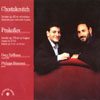Russian Cello Works
The superior recorded sound adds to the romantic atmosphere of this performance, though some may yearn for rougher edges
View record and artist detailsRecord and Artist Details
Composer or Director: Dmitri Shostakovich, Sergey Prokofiev
Label: Le Chant du Monde
Magazine Review Date: 4/2000
Media Format: CD or Download
Media Runtime: 69
Catalogue Number: LDC2781112

Tracks:
| Composition | Artist Credit |
|---|---|
| Sonata for Cello and Piano |
Sergey Prokofiev, Composer
Gary Hoffman, Cello Philippe Bianconi, Piano Sergey Prokofiev, Composer |
| Ballade |
Sergey Prokofiev, Composer
Gary Hoffman, Cello Philippe Bianconi, Piano Sergey Prokofiev, Composer |
| Moderato |
Dmitri Shostakovich, Composer
Dmitri Shostakovich, Composer Gary Hoffman, Cello Philippe Bianconi, Piano |
Author: DuncanDruce
Hoffman and Bianconi's performances here are most appealing - rich-sounding and warmly romantic. In the Shostakovich Sonata they don't have the concentrated, gripping quality we notice on the composer's own 1946 recording with Daniil Shafran, where both players have the knack of articulating each phrase with absolute precision (emphasised by a very dry sound). The immeasurably superior Chant du Monde recording, however, allows Hoffman and Bianconi to create a real sense of atmosphere, plaintive at the start of the Sonata, darkly sinister in the slow movement. The second movement provides an interesting contrast between old and new interpretations. Like Isserlis and Mustonen, this version opts for a fast speed and manic energy. Shostakovich (and Piatigorsky, another early exponent of the work) are slower, more heavily marked, and more pungent.
In the Prokofiev, Hoffman and Bianconi emphasise the lyrical aspects of the music. They're not quite as persuasive in the quirky second movement as Isserlis and Mustonen, with their lighter, more pointed style, nor do they project the first movement's grand expansiveness with the same intensity as Yo-Yo Ma and Emanuel Ax do, but the performance is still very convincing, offering a rather softer and gentler view of Prokofiev's late style (though with plenty of energy when it's required). The shorter pieces all fare well. The little Shostakovich Moderato was new to me; it sounds rather like Faure, but with a few hard edges. In short, even if these aren't interpretations to say the last word about the music, they're still impressive and idiomatic enough to be well worth investigating.
'
In the Prokofiev, Hoffman and Bianconi emphasise the lyrical aspects of the music. They're not quite as persuasive in the quirky second movement as Isserlis and Mustonen, with their lighter, more pointed style, nor do they project the first movement's grand expansiveness with the same intensity as Yo-Yo Ma and Emanuel Ax do, but the performance is still very convincing, offering a rather softer and gentler view of Prokofiev's late style (though with plenty of energy when it's required). The shorter pieces all fare well. The little Shostakovich Moderato was new to me; it sounds rather like Faure, but with a few hard edges. In short, even if these aren't interpretations to say the last word about the music, they're still impressive and idiomatic enough to be well worth investigating.
Discover the world's largest classical music catalogue with Presto Music.

Gramophone Digital Club
- Digital Edition
- Digital Archive
- Reviews Database
- Full website access
From £8.75 / month
Subscribe
Gramophone Full Club
- Print Edition
- Digital Edition
- Digital Archive
- Reviews Database
- Full website access
From £11.00 / month
Subscribe
If you are a library, university or other organisation that would be interested in an institutional subscription to Gramophone please click here for further information.




